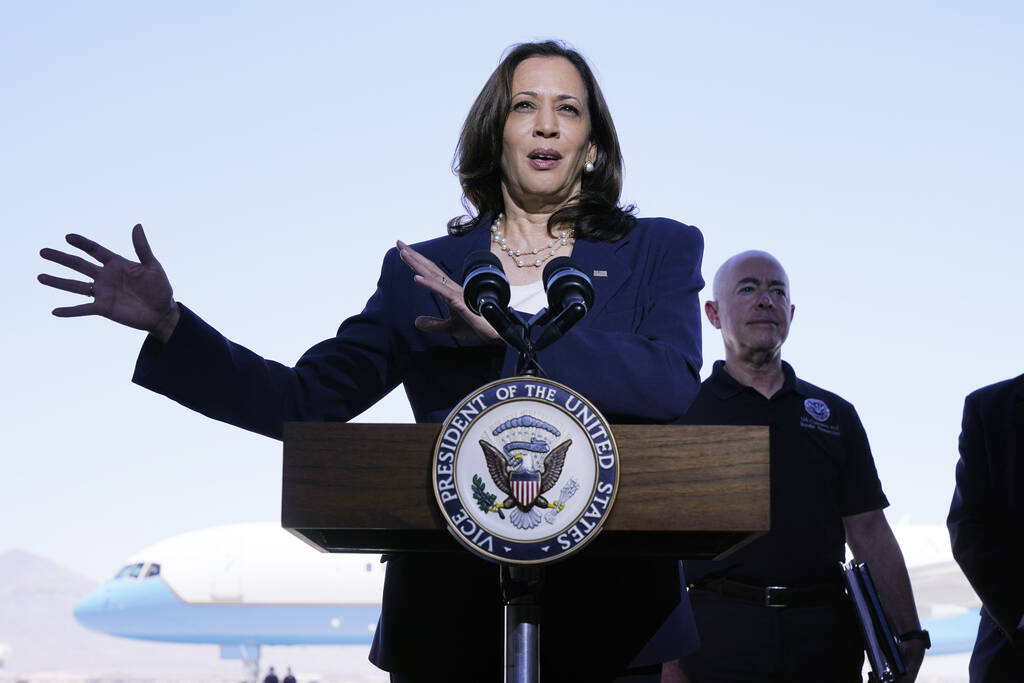RUBEN NAVARRETTE JR.: Kamala Harris still needs to unpack her story
Even now that Kamala Harris has delivered the biggest speech of her career and formally accepted the Democratic nomination for president, I still don’t feel connected to my fellow Californian.
Connecting is the whole idea, right? At times, that seems like the unofficial theme of the 2024 election. Voters are burned out on politics as usual, so they’re gravitating to the real and the authentic.
Republican vice presidential nominee JD Vance, despite growing up working class with a mother who battled addiction, has trouble relating to voters. This might be part of the reason his favorability rating is so low. Meanwhile, Vance’s Democratic counterpart, Tim Walz, has — as a former football coach and fellow Midwesterner — a knack for turning stump speeches into pep rallies. Walz’s favorability rating is higher than his opponent’s.
Harris’ problem? It’s impossible to connect with voters if you don’t tell your story in grueling detail, as often as you can. That’s what Bill Clinton, George W. Bush and Barack Obama did. All of them used their campaigns to spill the beans about everything from Bush’s struggles with alcohol to Obama being abandoned by his father.
There is no dispute that Harris has had an incredible personal journey, much of which happened in the express lane. In 2004, Harris was sworn in as San Francisco district attorney. Now, just two decades later, she is the Democratic nominee for president of the United States. That’s a long way to travel in a relatively short time.
The speech at the Democratic National Convention was Harris’ chance to introduce herself to the nation. First, it’s odd that someone who has spent 20 years in the public eye would — upon running for president — have to explain who she is, and what she stands for. But that’s where we are, and it presents the challenge Harris has to rise up and meet. She began to do that by talking about her childhood and crediting her father for helping to make her “fearless.”
The speech served its purpose. The American people needed to hear what kind of leader the Democratic nominee intends to be:
“I promise to be a president for all Americans,” she said. “You can always trust me to put country above party and self. To hold sacred America’s fundamental principles. From the rule of law. To free and fair elections. To the peaceful transfer of power.”
And how she views our country:
“I see an America where we hold fast to the fearless belief that built our nation,” she said. “That inspired the world. That here, in this country, anything is possible. Nothing is out of reach.”
And how she sees her fellow Americans:
“We are the heirs to the greatest democracy in the history of the world,” she said. “And on behalf of our children and grandchildren, and all those who sacrificed so dearly for our freedom and liberty, we must be worthy of this moment.”
Those are awesome words. But they don’t help us solve the riddle of Kamala Harris.
For instance, while serving as San Francisco district attorney, Harris set out to be a “progressive prosecutor” but wound up a hard-nosed conservative who threatened inner-city parents with jail time if their kids were truant from school. She has since said that she regrets the consequences of some of her policies. But that’s easy for politicians to say.
As she ended her speech, Harris asked her fellow Americans to help her write “the next great chapter in the most extraordinary story ever told” — that of the United States of America.
One thing at a time, Madame Vice President. First, let’s hear more of your own personal story. Here’s some of what I’m curious about:
How has her life been shaped by her gender or her race? In particular, as a biracial candidate, how have her dual backgrounds — Black and Indian — informed her views and politics? Has her identity as a stepparent made her more of an advocate for families? As the daughter of two immigrants, does she have more or less sympathy for immigrants and refugees than other Americans? Given that her parents had Ph.Ds, does she acknowledge her own privilege? And how would she use the power of the presidency to create a society where more people who look like her, or who have foreign roots like she does, can realize their own version of the American Dream?
I have many more questions, and I’m sure the American people do as well. Harris needs to provide the answers. So voters can connect with her. That’s how you win elections.
Ruben Navarrette’s email address is crimscribe@icloud.com. His podcast, “Ruben in the Center,” is available through every podcast app.

















